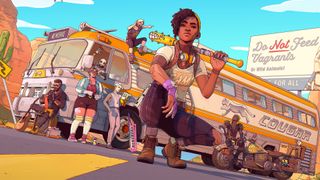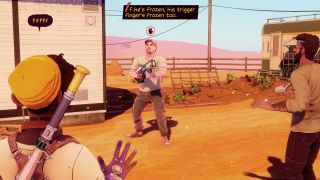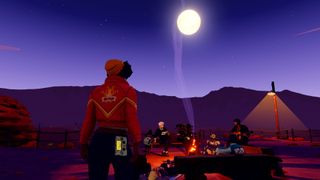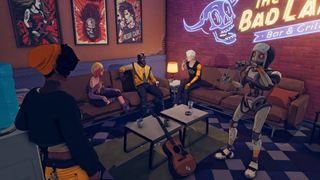Dustborn let me smash fascists and flirt with my situationship on a road trip across America
The future is queer—if you're along for a ride.

Dustborn is a narrative-driven, action-adventure road trip across a zany dystopian America. Set in an alternate-history (where JFK wasn’t the one that got shot and Silicon Valley seceded from the U.S.), friends, lovers, and found family flee across the country with a bat in one hand and guitar in the other. Undercover as a punk band on tour, this group of outcast queers and exploited workers fight fascist cops and smash corporate drones while navigating new and evolving relationships.
Releasing August 20 on Xbox, PlayStation, and PC, Dustborn is Norwegian Studio Red Thread Game’s first foray into action-adventure. It’s a strong departure in tone and genre from their 2019 mystery adventure Draugen and the studio's 2017 debut title, Dreamfall Chapters (a sequel to The Longest Journey and Dreamfall: The Longest Journey), but Dustborn impresses as a strong foray into combat. While each component of the system is simple, it’s all stylish and woven together with enough character to add something to its character-driven adventure, really befitting its comic book aesthetics.
Covered in retro-turned-sci-fi propaganda, Dustborn certainly reminds me of Fallout’s post-apocalypse, though Dustborn's neo-Western landscape is the result of a police state and evil tech companies (it's not that alternate a history, turns out). And with cel-shaded comic book art and neon punk wardrobes, Dustborn invites much aesthetic comparison. But within these familiar trappings is an unabashedly (pop) punk story about queers fighting cops and corporations exploiting workers.
Pax, a 30 something Black women covered in tattoos, is the fulcrum of the party, joined by her artist best friend Sai, on-again off-again fling Noam (they're a bit of a nonbinary stereotype, but I can’t say it’s untrue), and long-lost sister Ziggy. A dad-like figure, Theo, is the one heading up the smuggling operation, while a questionably sentient robot comes along as the driver and cook for the road trip. They’re also feared Anomals—who can harness the magical power of words after a mysterious event in the timeline's past.
You'll get to use these powers to beat up robots and bike gangs. Combat consists of basic melee combat with combos, blocks, and rolls, but also the magical spoken word powers. These buffs and attacks are incorporated into the action through a snappy UI that slows time, kinda like spells in FF7 Rebirth, keeping the action moving. And there’s narrative dressing to it all too. A simple buff that makes your attacks stronger ties into the Anomal's abilities as an actual put down of your enemies. When you fail to pull off a quick time event for special moves you can hear Pax stumble over her words failing to come up with a good diss. Another ability creates an illusion of flames that terrifies enemies and sends them running. It all fits nicely alongside combat banter that, as with the rest of the writing, actually lands much of its humor
As a queer who's found most of their friends and family at punk shows, the twee allegory about the power of language initially had me rolling my eyes. But I found Dustborn to be much more than a game about capital-R "Representation" waving a "games for change" banner. It's got class commentary, satire about evil tech companies, strong character writing, and inventive non-combat mechanics tying everything together.

Whether on the bus between stops or while exploring puzzle-filled destinations, Pax spends a lot of time talking to the party. There's a big emphasis on relationships being strained, rebuilt, and reshaped across the road trip, and my glimpse into how this takes shape after the party is established was promising. You'll be presented with different ways to solve problems that use different characters' abilities, but also change your relationships with them. While talking about an upcoming destination or brainstorming an obstacle you're prompted with multiple responses and solutions that will affect what a character thinks about you too, and Red Thread promises multiple endings for each character as a result.
The biggest gaming news, reviews and hardware deals
Keep up to date with the most important stories and the best deals, as picked by the PC Gamer team.
My favorite bit of my preview was the campground at night after all the action. Walking around the fire to check on everyone, choosing which questions to ask, how to respond. To lean in towards a Noam. To evade a question about my feelings. To pry. To show that I know each of my companions.

This wouldn't matter if the writing wasn't good, of course. And maybe the best thing I could say about the writing is that it really sounds like people shooting the shit with each other. Beyond the mechanical layer of language operating as powerful spells and the allegorical narrative you could contrive of it, what makes me most excited to see more of Dustborn is how its writers very clearly understand what power language has without any magic. What the party calls Anomals are branded "deviants" by the state, and in the press preview mission, the party befriends a member of a Mad Max-like biker gang out in the neo-west who only knows people with his vocal powers as "shoutmen" (it's like shaman but loud, get it?).
There's lots of words, and most of them are voice-acted and directed competently. What I found even more immersive were well-crafted character animations. Body language does a lot for adding character to everyone, and if you choose to bring Pax and Noam together they'll share soft touches and long gazes with each other.

Adding everything up, Dustborn actually begins to feel like an RPG: the road trip, the party of strong, clashing personalities, the quest against an oppressive system. It doesn't have any gear customization and the skill tree to upgrade Pax’s bat is rudimentary, but it's got all the heart of a great RPG with the interactive narrative systems of story-driven greats like Life is Strange and Goodbye Volcano High.
Whatever it all adds up to in the end, the future is queer—if you're along for a ride.
Most Popular


